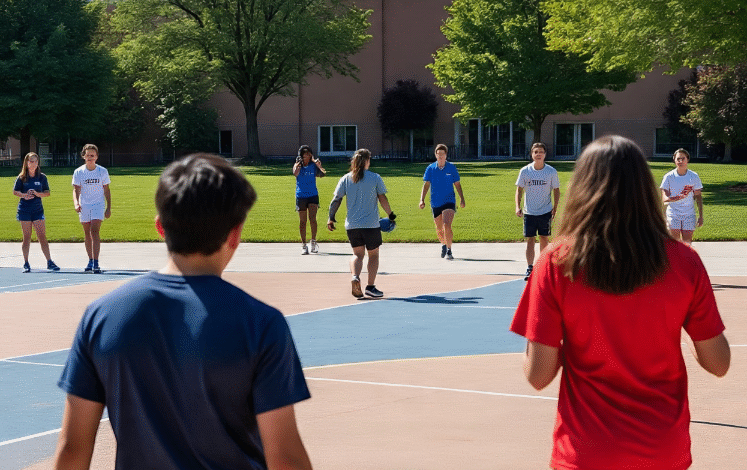Intramural Sports: Fun, Fitness, and Friendship on Campus

Intramural sports are a popular way for students and community members to stay active, meet new people, and enjoy healthy competition. Unlike varsity athletics, which focus on high-level competition, intramural sports are designed for participation, fun, and building community. Whether it’s basketball, soccer, volleyball, or even dodgeball, intramural sports provide a platform for everyone, from beginners to experienced players, to engage in physical activity without the pressure of professional or college-level competition.
Joining intramural sports is easy and often requires little more than signing up online, paying a small fee, and showing up ready to play. These programs are not just about winning games; they foster teamwork, leadership skills, and stress relief. For many students, intramural sports are a highlight of their college experience, offering a break from academics while staying active and healthy.
Table of Contents
What Are Intramural Sports?
Intramural sports are organized sports leagues that take place within a particular community, school, or college. The term “intramural” literally means “within the walls,” indicating that these sports are played among members of a single institution rather than against external teams. This is different from club sports or varsity teams, which often compete against other schools or organizations.
The primary focus of intramural sports is participation rather than high-level competition. These leagues can include both recreational and competitive divisions, allowing people with different skill levels to enjoy playing. Common intramural sports include:
- Basketball
- Soccer
- Volleyball
- Flag football
- Softball
- Tennis
- Table tennis
- Dodgeball
Benefits of Participating in Intramural Sports
Participating in intramural sports comes with numerous physical, mental, and social benefits.
1. Physical Fitness: Intramural sports provide regular exercise, helping participants maintain a healthy lifestyle. Running, jumping, and other movements improve cardiovascular health, strength, and flexibility.
2. Mental Health: Sports help reduce stress and anxiety. Playing a game with friends releases endorphins, the body’s natural “feel-good” chemicals, which can improve mood and mental well-being.
3. Social Connections: Intramural sports are an excellent way to meet new people and make friends. They create a sense of community and belonging, especially for students new to campus or residents in a city.
4. Teamwork and Leadership Skills: Playing on a team encourages communication, collaboration, and leadership. Participants learn to work together toward a common goal, which is a valuable skill on and off the field.
5. Fun and Enjoyment: Above all, intramural sports are fun. They provide an enjoyable way to stay active and compete without the pressure of professional sports.
How to Get Involved in Intramural Sports
Getting involved in intramural sports is usually simple and accessible for everyone. Here’s a step-by-step guide:
1. Check Your Campus or Community Offerings: Most colleges, universities, and community centers offer intramural sports programs. Check their website or student activities office for information.
2. Register for a League or Team: Sign up individually or as part of a team. Some programs allow you to join a free agent pool if you don’t have a full team.
3. Attend Practices and Games: Depending on the league, you may have weekly games or optional practices. Be sure to attend regularly to enjoy the full experience.
4. Follow the Rules: Intramural sports have rules that are usually simpler than varsity or professional rules. Respecting these rules ensures fair play and enjoyment for all participants.
5. Have Fun: Remember, the goal is to enjoy the sport, improve skills, and meet new people. Winning is secondary to the experience.
Popular Intramural Sports
Different intramural sports attract different types of participants. Here are some of the most popular options:
Basketball: Fast-paced and fun, intramural basketball is often played in 3-on-3 or 5-on-5 formats. It improves agility, teamwork, and coordination.
Soccer: Soccer is a global favorite and perfect for participants of all skill levels. It promotes endurance, strategy, and communication.
Volleyball: Volleyball can be played indoors or on the beach, making it versatile. It helps improve reflexes, hand-eye coordination, and teamwork.
Flag Football: A non-contact version of traditional football, flag football emphasizes speed, strategy, and fun without the risk of serious injuries.
Softball: Softball is a great choice for those who enjoy batting and fielding in a relaxed environment. It encourages team strategy and friendly competition.
Dodgeball: Dodgeball is fast, energetic, and fun. It encourages quick reflexes, agility, and teamwork.
Tips for Success in Intramural Sports
1. Communicate: Effective communication with your teammates is essential for success. Make sure everyone understands the strategy and positions.
2. Attend Practices: Even if you play for fun, attending practice improves skills and strengthens team dynamics.
3. Stay Positive: Maintain a positive attitude. Encourage teammates, celebrate small victories, and learn from losses.
4. Be Flexible: Intramural sports often have participants of varying skill levels. Adapt your style of play to accommodate teammates and opponents.
5. Prioritize Safety: Wear appropriate gear, warm up before games, and stay hydrated to prevent injuries.
Conclusion
Intramural sports are more than just games—they are a way to stay fit, relieve stress, develop skills, and create lifelong friendships. Whether you are a student on campus or a community member, participating in intramural sports is an enjoyable and rewarding experience. The focus is on fun, participation, and personal growth rather than competition, making it an inclusive activity for everyone. By joining a league, you can improve your physical and mental well-being, meet new people, and create memorable experiences.
If you haven’t tried intramural sports yet, now is the perfect time to get involved. Sign up, bring your energy, and experience the fun, camaraderie, and excitement that intramural sports offer.
FAQs
Q1: Do I need to be experienced to join intramural sports?
A: No, intramural sports are for all skill levels. Beginners and experienced players are welcome.
Q2: Are intramural sports competitive?
A: They can be, but the main focus is participation and fun. Most leagues have recreational divisions for less competitive play.
Q3: Can I join without a team?
A: Yes, many programs have free agent lists where individuals can be placed on a team.



